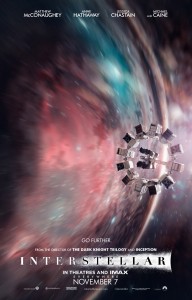Film Review: Interstellar May Be the Best Movie of the Year

Interstellar, starring Matthew McConaughey, Anne Hathaway, Jessica Chastain, and Michael Caine, and directed by Christopher Nolan (Memento, Inception, and the Dark Knight trilogy) may just be the best movie of the year. Incorporating a fantastic cast, an amazing score by the renowned Hans Zimmer, a well-thought-out plot, and gripping cinematography, Interstellar has it all. It even avoids the scientific errors known to spoil other sci-fi films (sound in the vacuum of space, erroneous technology, junk science), allowing both the common theatergoer and the scientifically minded to enjoy the film with little complaint.
The film details a future for humanity in which we have used up all the resources on Earth. Blight is rampant and our crops are routinely destroyed, causing much of humanity to starve and our civilization to stagnate both technologically and culturally. Led by a clandestine incarnation of NASA, humanity seeks to travel to a habitable world outside of our own solar system, a feat that is made possible due to the appearance of a wormhole that has mysteriously appeared alongside Saturn.
I was surprised by how scientifically accurate this movie was, even though it had very brief moments of dubious scientific thinking. Still, the proper application of the theory of relativity and the creative way in which its consequences were applied to human relationships left me in awe. But while the events of the film are enormously interesting, there are other aspects of the film that make it groundbreaking.
Interstellar is a fantastic film not only because it attempts to reconcile scientific discovery with a dystopian and slightly fantasy-based future, but because it attempts to show us how our society might look. Gone are the days when scientists are all nerdy white men—half of the scientists in Interstellar are women, and a significant number of the scientists aren’t white. Women and men appear at least on the surface to be appreciated equally for their intellectual abilities and desire to advance scientific thinking. This is an enormously important thing for Interstellar to portray, for within the legions of teenagers who will see this film are potential women scientists inspired by the equality portrayed.
Another interesting element of Interstellar was its perspective on education. Children are taught that the moon landing never happened, and the relevant information is removed from science and history textbooks. This restriction on and distortion of knowledge may very well happen in the future on several different academic topics, at least if current trends continue. Schoolbooks in Georgia and across the nation are under constant threat of having any mention of evolution removed, and controversial books and literature are frequently banned, suggesting that we will face the problem of the restriction of information in the very near future.
Reflecting on how current human actions might impact our future and marrying those ideas to an exciting sci-fi narrative is something blockbuster movies rarely do, and it’s what makes Interstellar so unique and compelling. This winning formula gives me hope that not all highly-funded Hollywood films will be mindless action movies or juvenile frat-bro comedies. Interstellar is an indication that humanity still looks to be inspired by scientific discovery and that people are willing to buy a movie ticket in order to experience that inspiration. I take it as a hopeful sign that this film is only one of several compelling sci-fi movies to be supported by the movie industry of late.
